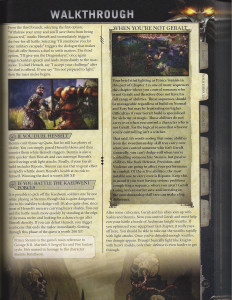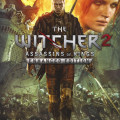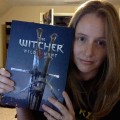 If I had to describe The Witcher 2 strategy guide in one word, it would be efficient. The guide itself is efficient to be sure, but that’s not just that. The strategy guide provides users with the most efficient way to play the monstrosity that is The Witcher 2. If you follow it closely, or even relatively closely, you will literally shave off hours of game playing time. The hours you save aren’t even fun hours you’re missing. They’re wasteful hours that will mostly consist of running to the same places repeatedly for little experience value (after all, you really don’t get true experience just for killing things) and cause great annoyance and frustration. Oh and the strategies it offers for living longer than ten minutes are rather spot on as well, if you’re into that kind of thing.
If I had to describe The Witcher 2 strategy guide in one word, it would be efficient. The guide itself is efficient to be sure, but that’s not just that. The strategy guide provides users with the most efficient way to play the monstrosity that is The Witcher 2. If you follow it closely, or even relatively closely, you will literally shave off hours of game playing time. The hours you save aren’t even fun hours you’re missing. They’re wasteful hours that will mostly consist of running to the same places repeatedly for little experience value (after all, you really don’t get true experience just for killing things) and cause great annoyance and frustration. Oh and the strategies it offers for living longer than ten minutes are rather spot on as well, if you’re into that kind of thing.
The Witcher 2 is overwhelming on two counts. One, it’s a huge game with lots of choices that you can’t foresee the outcome of right away. For instance, in games like Mass Effect and inFamous, you can somewhat predict what your decisions will lead to. They’re rather obvious that one is the good choice and one is evil (or renegade). In The Witcher 2…not so much. I decided to save some elves being burned to death rather than go after this crooked mayor. I assumed that one of my companions who was chasing after him would catch up with him and either kill him or arrest him. In the closing cut-scenes, I learned that nothing happened to the bastard, and he did awful, awful things to the people I left behind. (That crushed me.) If I had read the guide’s discourse on how my decision would affect this and that more closely, I probably would have decided something different. This is one aspect that I greatly appreciated with the guide, since I know I won’t be playing it more than once and because I obsess over these decisions. I was a basket-case when trying to make my decisions in the Mass Effect series, so this nearly put me over the top.
For each decision that is presented, the guide explains the following:
- what the decision entails;
- what the outcomes are;
- what Geralt earns from it;
- Achievements earned, if any; and
- how this decision affects decisions and the plot later down the line.
 If the decision has no bearing on anything, the guide points that out as well. It also gives a similar discourse on all dialogue trees that Geralt can unlock. Thanks to those, I avoided a nasty brawl and only had a one-on-one encounter in one situation.
If the decision has no bearing on anything, the guide points that out as well. It also gives a similar discourse on all dialogue trees that Geralt can unlock. Thanks to those, I avoided a nasty brawl and only had a one-on-one encounter in one situation.
As another part of its massiveness, the game has lots of sidequests that take hours to complete–each, not total. Here is where most of the strategy guide’s efficiency shines brilliantly. Before sending you off on a particular sidequest or even a main story quest, the guide will lump together quests that can be achieved at the same place or along the way and at the same time. If you haven’t unlocked that sidequest yet, it will order you to and tell you how. As the user, you have to ignore the fact that oftentimes, these quests don’t sound like they could ever be completed together. But lo and behold, they can be. Hours instantly saved, and there was much rejoicing on my part, especially since there is no fast travel option in the game (grrrrr).
The second reason why The Witcher 2 is overwhelming is the complicated combat that is thrust upon you from the get-go. Most games ease you into the gameplay by teaching you a few combat techniques at a time. This game, as a friend once said, gives you a spoon and kicks you out the door to fight a dragon. You have all of these combat methods at your disposal and no real way of learning them other than by failing and dying a lot. With the enhanced edition, there is a brief tutorial that somewhat explains all of the traps, spells, and sword techniques Geralt has, but there are so many and the tutorial is so quick, it’s impossible to learn everything and master it before your first real fight. It doesn’t help that Geralt can do a lot of things. (And I mean a lot a lot.) I play a lot of action-RPGs, but I rarely think beyond sword thrusts and spells. Adding traps, bombs, and sword-enhancing potions to the mix while trying to survive ten people stabbing at you at once–there is no bushido here–was a little too much for me to sort out within the first ten minutes of the game.
As a result, when I say I wouldn’t have survived my first fight without the guide, I really, I really mean it. Obviously as I grew accustomed to the vast combat, I got better and didn’t rely so heavily on the guide’s suggestions. However, I often checked out the guide’s tips for rather unusual ways to kill enemies and bosses. There was always something completely random tucked away in there that made me laugh.
If I had to name one RPG that really needed a strategy guide more than others, I would have to say that would be Dark Souls. But if I could say two games, The Witcher 2 would be a very, very close second. Thankfully, The Witcher 2 strategy guide lives up to all [needed] expectations. It’s an absolute must when you absolutely, positively have to kill every monster overnight. (Seriously, overnight. This guide won’t let you run around on a wild goose chase for hours on end.)
SGR Rating: 5/5
Author: Alicia Ashby
Publisher: Prima Games
Editions available: Paperback
Acquired via Publisher




Leave a Reply